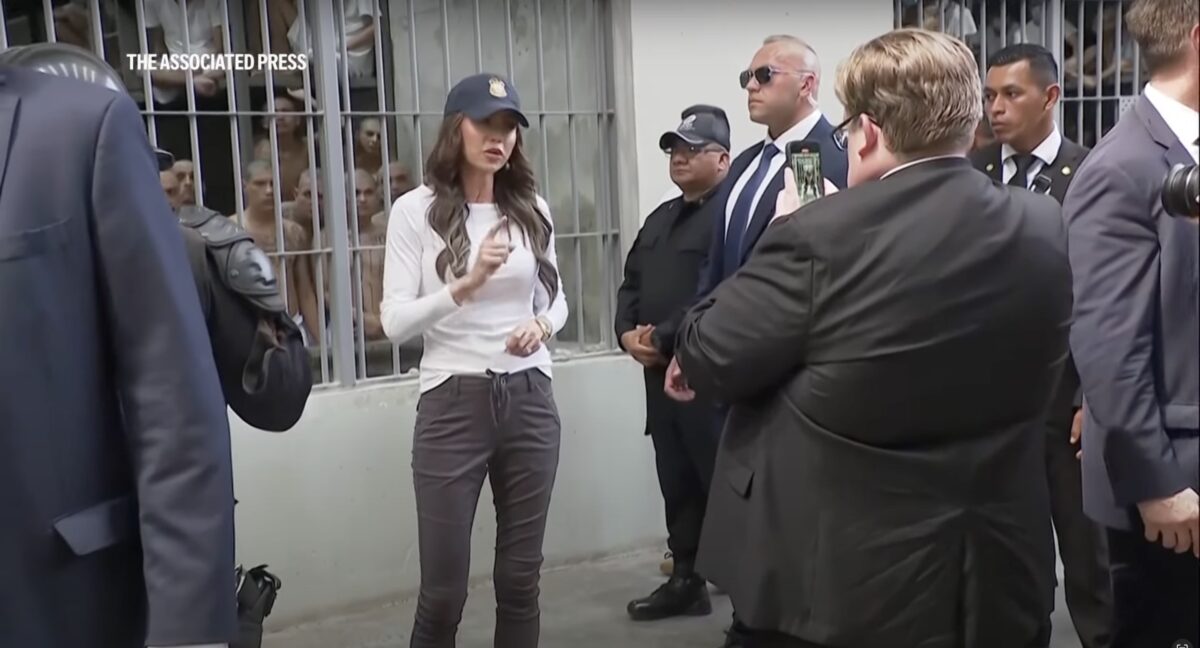Kristi Noem’s El Salvador Prison Photo Op Might Have Violated the Geneva Convention

Screenshot via Associated Press on YouTube.
Department of Homeland Security Secretary Kristi Noem’s photo op in an El Salvadoran prison drew swift backlash online, but some observers are pointing out that it may have also violated the Geneva Convention.
A short video Noem posted on social media drew a cascade of critical responses, commenting on not just the chilling visual of the prisoners crowded in the cell behind her, heads shaved and shirtless, but the jarring contrast with her perfectly coifed hair, makeup, and what appeared to be a Rolex Daytona watch, which currently retails for nearly $50,000.
Noem was at the Centro de Confinamiento del Terrorismo, abbreviated CECOT, in Tecoluca, El Salvador, a notorious maximum security prison where the Trump administration has controversially deported several hundred Venezuelan immigrants, claiming they are part of the Tren de Aragua (TdA) gang. Several of the arrests have already been challenged as cases of mistaken identity or misinterpreting tattoos of sports logos, song lyrics, etc. as gang-related. There has been bipartisan criticism of the treatment of these immigrants over due process and other civil rights issues, including questions about the longstanding reports of human rights abuses at CECOT.
Reporters with the Associated Press also captured a video of Noem’s visit, as seen in the YouTube clip below.
In both video clips, Noem can be seen speaking about immigration issues in support of President Donald Trump’s agenda, calling the immigrants that the U.S. had sent there “terrorists.”
“Do not come to our country illegally,” Noem warned. “You will be removed and you will be prosecuted. But know that this facility is one of the tools in our toolkit that we will use if you commit crimes against the American people.”
In a March 15 executive order, Trump invoked the Alien Enemies Act of 1798 — the same law that was used to justify the detention of Japanese Americans during World War II — and declared that TdA was “a designated Foreign Terrorist Organization with thousands of members, many of whom have unlawfully infiltrated the United States and are conducting irregular warfare and undertaking hostile actions against the United States,” and part of a “regime-sponsored, narco-terrorism enterprise.”
Under the Alien Enemies Act, the president has additional powers to detain, secure, and remove non-citizens during times of a declared war or an “invasion or predatory incursion” that is “perpetrated, attempted, or threatened” against U.S. territory. The White House has pointed to this law, and the president’s executive order issued pursuant to it, to justify the revocations of green cards, arrests and deportations, and other actions taken as necessary to “defend” the U.S. against an “invasion” of illegal immigrants.
But by invoking the Alien Enemies Act and repeatedly using language declaring the situation to be a war or invasion, some observers have argued, the Trump administration may have also invoked the Geneva Convention, the international humanitarian treaties that establish legal standards for human rights in war.
The humanitarian laws included in the Geneva Convention mandate that “prisoners of war must at all times be humanely treated and protected against acts of violence, intimidation, insults, and public curiosity,” wrote Secretary of the Navy John H. Chafee in 1971 during the height of the Vietnam War.
That means that “[p]risoners may not be publicly exploited for purposes of propaganda,” wrote Jonathan V. Last in a scathing column at The Bulwark that pointed out the grotesque nature of Noem’s photo op, with the prisoners dressed alike, “crammed into a cell,” unmoving, silent, and not making any facial expressions.
“They have clearly been posed by the jailers, forced to hold position so that they can be useful props for the American woman so that she can manufacture propaganda for her regime,” wrote Last. “We have seen this kind of thing before. Just not from America.”
“I want to be deadly serious about this: We are now the bad guys,” he somberly added. The “goal” for such propagandistic photo ops was “always the same,” he added. “To use prisoners’ bodies as weapons of political war and to do so against their will. This is what evil, illiberal regimes do.”
Last lambasted the “carefully engineered” visual crafted by Noem and her staff, of a “high-ranking American official” visiting “foreign gulags” that America is using to “warehouse enemies of her regime”:
She visits the prison armory and shakes her head approvingly while inspecting the rifles. Then she pauses in front of a cage where human beings have been posed to her liking so that she can speak to the cameras in front of a powerful visual. She is sending a message on behalf of her country.
The message is this:
America is no longer a shining city on a hill. It is no longer the leader of the free world. It no longer stands on the side of liberty as a beacon for those who yearn to breathe free.
Regardless of how the specific nuances of international law would ultimately determine whether or not the Geneva Convention protection applies to Venezuelan immigrants the U.S. deports to an El Salvadoran prison, that shouldn’t be necessary the United States government to honor the principles of our own Constitution and laws. If these immigrants are violent criminals and gang members, that should be simple enough for the government to prove in court and allow these people at least a bare minimum of due process protections.
This is an opinion piece. The views expressed in this article are those of just the author.
New: The Mediaite One-Sheet "Newsletter of Newsletters"
Your daily summary and analysis of what the many, many media newsletters are saying and reporting. Subscribe now!






Comments
↓ Scroll down for comments ↓